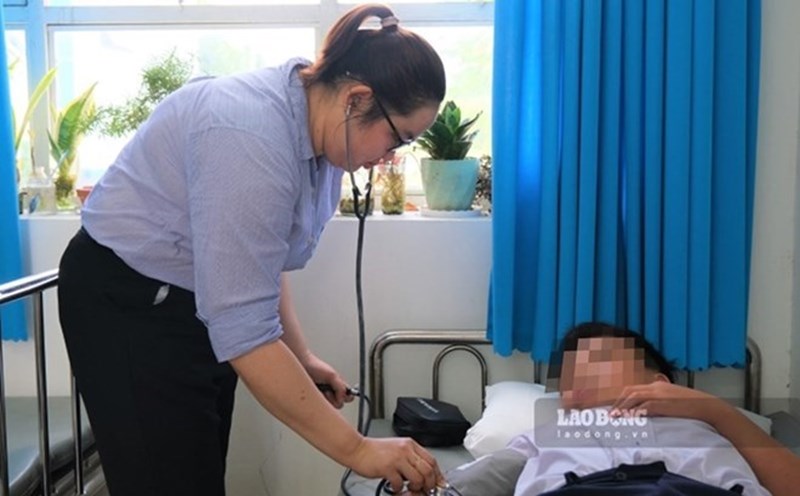Big responsibility, little treatment
In 2011, Ms. Le Thi Chung (born in 1987, from Ba Long commune, Dakrong district, Quang Tri province) was recruited as a health care worker. Currently, she is working at Ba Long Kindergarten. Ms. Chung said that the school has 20 employees and 143 students, with the job position, she is responsible for taking care of the health of staff and all students and boarding work at the school.
The workload is not small, so Ms. Chung also works as an office worker at school with many tasks. Responsibility for work is not small, but after 14 years of working and always completing tasks well, Ms. Chung's income is only 7 million VND/month (including salary, regional allowances and positions).
At schools in Quang Tri province, health care staff have to take on many important tasks. Every day, they are on duty at school to immediately respond when students have accidents or injuries. For boarding schools, they also take charge of checking food, storing samples, and ensuring food safety and hygiene.
In addition, health care workers must monitor students' health and growth charts to propose appropriate nutritional plans, monitor school environment hygiene, prevent epidemics, detect early signs of autistic children... The work also includes collecting and preparing student health insurance records; preventing and combating child sexual abuse; preventing the harmful effects of tobacco, e-cigarettes, drugs...
The workload is large and the requirements are high, but the treatment regime for health care staff is not commensurate.
Need to pay benefits for health care
According to statistics from the Department of Education and Training of Quang Tri province, as of February 2025, the whole province has 204 full-time health workers and 179 part-time workers. From January 2024 to present, according to Official Dispatch No. 1719/SNV-CCVC dated December 28, 2023 of the Department of Home Affairs of Quang Tri province, educational institutions across the province have stopped implementing preferential allowances for health care staff, affecting hundreds of employees' income.
According to the leader of the Department of Home Affairs, Decree No. 56/2011/ND-CP stipulates that the payment of allowances must rely on career revenue. However, schools mainly rely on the State budget, not generating revenue from health services, so the Department of Home Affairs proposes not to pay allowances to health care staff.
Ms. Le Thi Huong - Director of the Department of Education and Training of Quang Tri province - said that currently, 100% of educational institutions in the province have arranged enough medical staff or teachers to concurrently work in health and wellness. However, the suspension of preferential allowances for health care staff has resulted in the loss of income for this group. Therefore, the provincial Department of Education and Training has proposed that the Department of Home Affairs coordinate with relevant units to advise the Provincial People's Committee on implementing the preferential allowance regime for health care staff according to the provisions of Decree No. 56/2011/ND-CP supplemented by Decree No. 05/2023/ND-CP of the Government.
At the same time, it is recommended that the People's Committees of districts, towns and cities pay attention to allocating funds according to the current budget decentralization to implement health care work, while fully implementing the regimes and policies for health care staff so that they can work with peace of mind.













